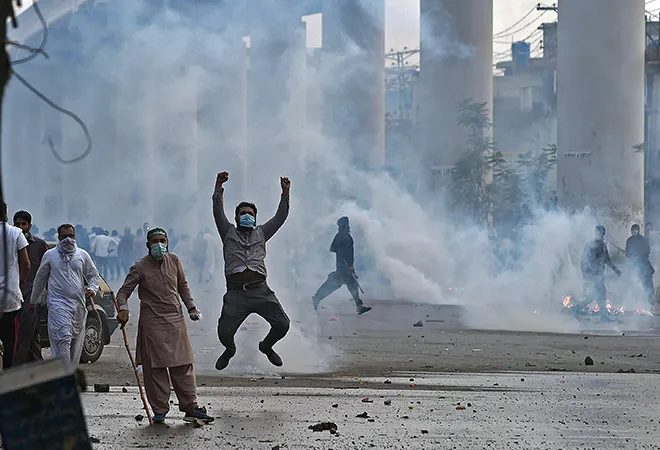
In Pakistan, it is commonplace for those with political power to make way for an Islamist group in the hope of winning leverage with the ultra-conservative members of society. All political parties have at some point, appeased a controversial maulana or broken bread with a far-right group, but no group in recent times has had the amount of sway and influence that the Tehreek-e-Labbaik Pakistan (TLP) has had. Earlier last week, the leader of the TLP was detained by security forces unleashing mayhem across the country. TLP cadres vandalised public property, block highways, killing two people, including a policeman, and has stalled normalcy for three days. After ignoring the rioting for three days, the country’s interior minister announced the government’s decision to ‘ban’ the group. Nonetheless, the TLP’s actions demonstrated the growing threat that extremist groups pose in Pakistan and how the steady mainstreaming of such violent groups has led Pakistan to be held hostage by their own creations.
TLP cadres vandalised public property, block highways, killing two people, including a policeman, and has stalled normalcy for three days.
The TLP is one of the most successful far-right groups in Pakistan. It draws its inspiration from Mumtaz Qadri, the fanatic responsible for killing Punjab Governor Salman Taseer in 2011 for criticising the country’s blasphemy law. The chief, Saad Hussain Rizvi, was detained by security forces on 10 April 2021, supposedly as a preemptive measure before the group’s demands are presented before the Parliament. The TLP demands include expulsion of the French ambassador from the country and severance of diplomatic ties with France. The reason for their demands lies in the group’s obsession with being the supposed guardians of Prophet Muhammad’s honour and custodian of Pakistan’s infamous and controversial blasphemy laws.
In October 2020, TLP protested after French President Emmanuel Macron, defended freedom of speech and expression in response to a deadly attack on French teacher for showing caricatures of Prophet Mohammad. Along with leaders of other Muslim nations, Imran Khan criticised Macron for “deliberating provoking Muslims.” The following month, TLP marched from Rawalpindi to Islamabad, demanded the expulsion of the ambassador from the country and a severance of diplomatic ties with France. Accusing the French government of Islamophobia, the Khan government gave in to the Islamists, promising to put forward their demands to the Parliament, which is expected later this month. Hence, the reason for Rizvi’s preemptive detention.
The Imran Khan government has been consistent in its appeasement of the TLP, giving into the groups’ demands over the years. This has encouraged the TLP to seek greater concessions from the government from time to time, as well as giving other far-right groups and individuals the incentive they need to mobilise and put forward their Islamist agenda as well.
The Imran Khan government has been consistent in its appeasement of the TLP, giving into the groups’ demands over the years.
In 2018, after the Supreme Court acquitted Asia Bibi, a Christian woman accused of blasphemy in 2010, the TLP brought the country to a standstill for three weeks as they protested Bibi’s acquittal and made threats to kill the Supreme Court judges. While initially rebuking the protestors, Khan’s government, the following day, reached an agreement with them resulting Asia Bibi not being allowed to leave the country and a release of all arrested TLP members. In 2017, the government fired the renowned economist, Atif Mian, from its advisory council, after right wing groups — led by the TLP — protested against his Ahmadi faith. Ahmadis, remain one of the most persecuted and discriminated minorities in Pakistan, with the law not recognising them as ‘true Muslims.’
Imran Khan’s appeasement of the group has gone so far as to placate the groups’ concerns on all aspects of social and cultural life in the country. Zindagi Tamasha, an international-award winning film about the ludicrousness of the country’s blasphemy law and double standard when it comes to what religious clerics can and supposedly cannot do, was protested against by the TLP. The government succumbed to the group’s pressure and banned the movie from being released in Pakistan. The irony is that the movie is Pakistan’s official entry to the Oscars while remaining unreleased in Pakistan. A movie that discusses what is considered blasphemous in Pakistan, is unamusingly, banned from Pakistan for being blasphemous.
While earlier, Barelvi groups may have remained on the periphery, ignored by the state; however, this is no longer the case.
It is not only under the Pakistan Tehreek-e-Insaf (PTI) government that the TLP has reared its ugly head. Before it was a political party, in 2017, the TLP brought life in Rawalpindi and Faizabad to a halt for three weeks, a sit-in that was successful because they had the backing of the Inter-Services Intelligence (ISI) and achieved their objective of getting the resignation of the law minister over his alleged role in proposing changes to the wording of the oath taken by parliamentarians, as they deemed it to be blasphemous. At the time, with Prime Minister Shahid Abbasi of the Pakistan Muslim League (Nawaz) (PML-N) in power, the aim of the establishment was to destabilise and humiliate the government with General Bajwa refusing to clear the protestors and instructing the government to solve the matter amicably.
The events of the past week are a reminder of how far Barelvi militancy, long dormant amongst the sea of Deobandi groups, has progressed — thanks to the TLP. While earlier, Barelvi groups may have remained on the periphery, ignored by the state; however, this is no longer the case. The TLP poses a challenge to the military-intelligence establishment as it continues to grow and gain popularity. The extremism, zealotry, combined with a narrow view of Islam of the TLP has already won it two seats in the Sindh assembly and has allowed the party to emerge as the third-largest in terms of votes in Punjab during the 2018 general election.
The events of the past week are a reminder of how far Barelvi militancy, long dormant amongst the sea of Deobandi groups, has progressed — thanks to the TLP.
Whether the government and their military handlers accept the TLP ludicrous demands or not, they already have a serious problem on their hands. The TLP’s ability to dictate terms to a government, both in terms of foreign policy and parliamentary agenda shows that it is already too late. The state’s hypocrisy of crushing peaceful protests such as the Pashtun Tahafuz Movement (PTM) which have legitimate concerns and allowing the TLP to proselytise their terrorist agenda show the state’s remarkable inability to learn from any of its past mistakes. From knocking on Rawalpindi’s door a few years ago, the TLP will soon be ready to break down the door and walk right in.
The views expressed above belong to the author(s). ORF research and analyses now available on Telegram! Click here to access our curated content — blogs, longforms and interviews.




 PREV
PREV


